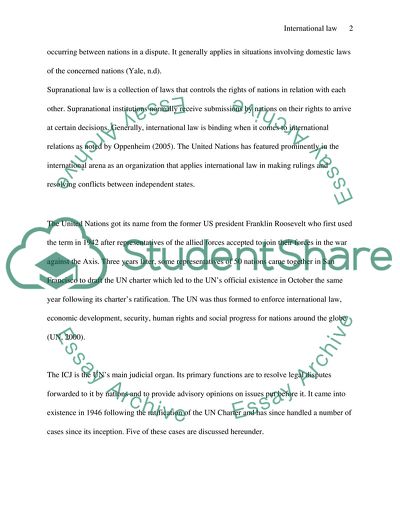Cite this document
(The UN and International Law Coursework Example | Topics and Well Written Essays - 2000 words, n.d.)
The UN and International Law Coursework Example | Topics and Well Written Essays - 2000 words. Retrieved from https://studentshare.org/law/1735447-examining-the-different-sources-of-international-law-and-looking-at-case-examples-consider-if-the-international-court-of-justice-has-been-successful-in-resolving-international-disputes-is-there-any-need-for-further-reform-of-the-united-nations-as-an-ins
The UN and International Law Coursework Example | Topics and Well Written Essays - 2000 words. Retrieved from https://studentshare.org/law/1735447-examining-the-different-sources-of-international-law-and-looking-at-case-examples-consider-if-the-international-court-of-justice-has-been-successful-in-resolving-international-disputes-is-there-any-need-for-further-reform-of-the-united-nations-as-an-ins
(The UN and International Law Coursework Example | Topics and Well Written Essays - 2000 Words)
The UN and International Law Coursework Example | Topics and Well Written Essays - 2000 Words. https://studentshare.org/law/1735447-examining-the-different-sources-of-international-law-and-looking-at-case-examples-consider-if-the-international-court-of-justice-has-been-successful-in-resolving-international-disputes-is-there-any-need-for-further-reform-of-the-united-nations-as-an-ins.
The UN and International Law Coursework Example | Topics and Well Written Essays - 2000 Words. https://studentshare.org/law/1735447-examining-the-different-sources-of-international-law-and-looking-at-case-examples-consider-if-the-international-court-of-justice-has-been-successful-in-resolving-international-disputes-is-there-any-need-for-further-reform-of-the-united-nations-as-an-ins.
“The UN and International Law Coursework Example | Topics and Well Written Essays - 2000 Words”. https://studentshare.org/law/1735447-examining-the-different-sources-of-international-law-and-looking-at-case-examples-consider-if-the-international-court-of-justice-has-been-successful-in-resolving-international-disputes-is-there-any-need-for-further-reform-of-the-united-nations-as-an-ins.


